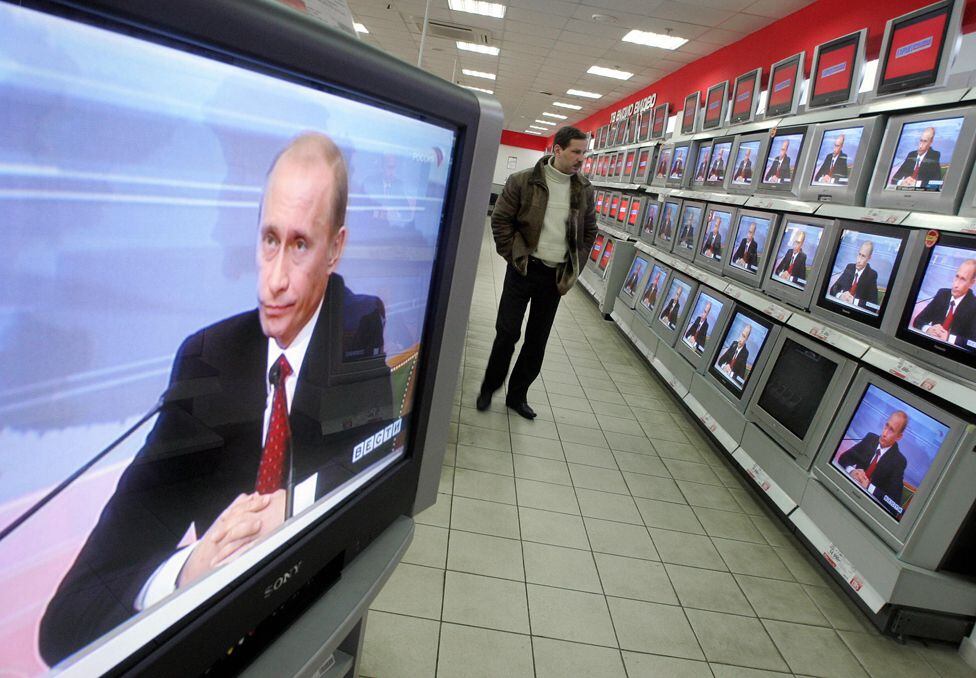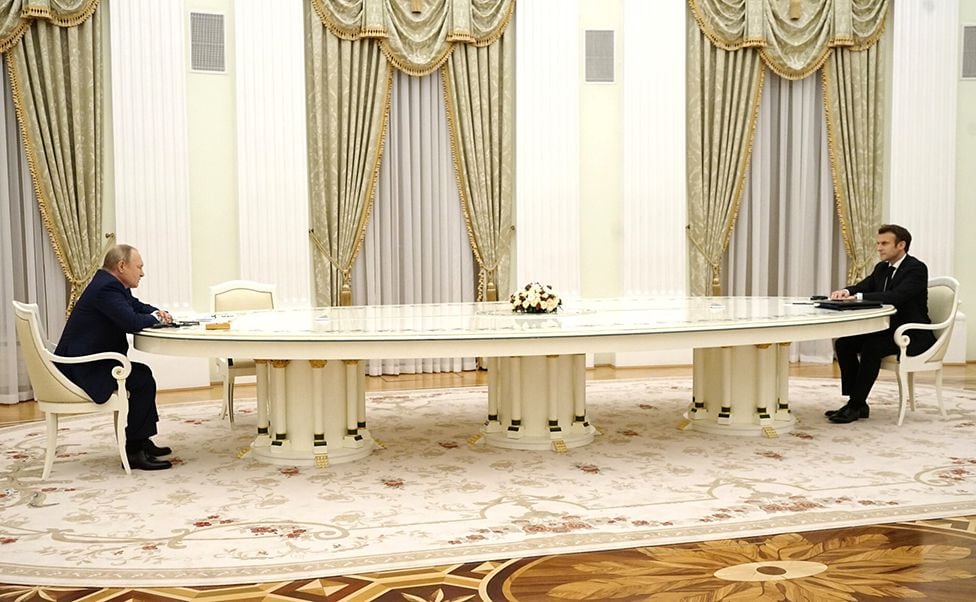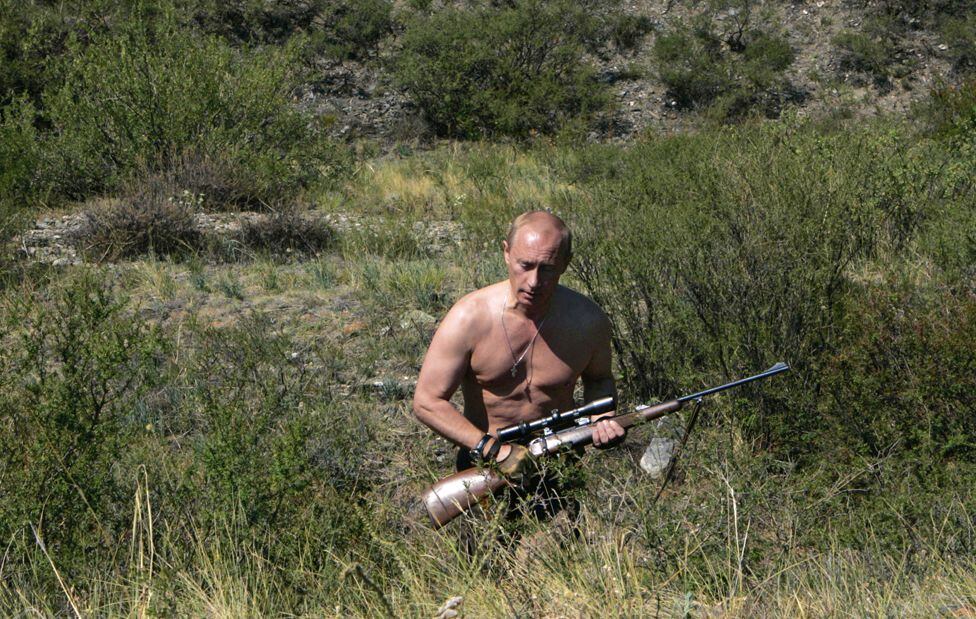The President of Russia, Vladimir Putin, is trapped in a hermetic world created by himself, as Western spies believe. And that is what has them worried.
For years they have tried to penetrate Putin’s mind, in order to better understand his intentions.
SIGHT: What are hypersonic missiles and why their use by Russia in Ukraine “is a signal” from Moscow to the West
With Russian troops seemingly stuck in Ukraine, it has become more necessary than ever to try to figure out how it will react under pressure.
Understanding your state of mind will be vital to prevent the escalation of the crisis to more dangerous levels.
- “I looked at the ground and saw my little granddaughter with her head completely smashed”: the heartbreaking stories of the Mariupol bombing
- What is Orwellian doublespeak and how does it apply to Putin’s messages about the war in Ukraine?
- Why Russia has failed to control the skies over Ukraine (despite having one of the largest air forces in the world)
It has been speculated that the Russian leader is ill, but many analysts believe that he has actually been isolated and blocks any alternative opinion.
The isolation has been evidenced in the photos of his meetings, such as the one he held with the president of France, Emmanuel Macron, when the two were sseated at the ends of a long table. That was also obvious in the meeting Putin had with his own national security team on the eve of the war.
Putin’s initial military plan looked like something conceived by a KGB agent, a Western intelligence official explains.
It was created, they say, by a closed group with an emphasis on secrecy. But the result was chaotic. Russian military commanders were not prepared and some of the soldiers were sent to the border without knowing what they were doing.
the only manager
Western spies, through unnamed sources, knew more about those plans than many within the Russian leadership circle. But now they face a new challenge: to understand what will be the next step of the president of Russia. And that is not easy.
“The challenge in understanding the Kremlin’s moves is that Putin is the only one in charge in Moscow,” explains John Sipher, the CIA’s former director of Russia operations. And while his views are often expressed in public statements, knowing how he will put them into action is a more complicated intelligence challenge.
“In a system as well protected as Russia, it is extremely difficult to gather intelligence on what is going on inside a leader’s head, especially when your own people don’t know what’s going onSir John Sawers, former director of the British intelligence service MI6, told the BBC.
Putin, intelligence agents say, is isolated in a bubble of his own makingwhere very little external information penetrates, particularly any that might contradict what you think.
“He is a victim of his own propaganda, in the sense that he only listens to a certain number of people and turns a deaf ear to everything else. That gives him a very strange perspective on the world,” says Adrian Furnham, professor of psychology and co-author of the soon to be published book “The Psychology of Spies and Espionage.”
The risk is what is known as “groupthink” in which everyone reaffirms their point of view. “If he is a victim of groupthink, we need to know who is in that group,” says Professor Furnahm.
The circle Putin talks to has never been large, but by the time the decision to invade Ukraine was made, it had been reduced to a handful of people. Western intelligence officials believe it is all those “faithful believers” who share their mindset and obsessions.
The sense of how small his inner circle has become was made clear when he publicly berated the director of his own Foreign Intelligence Service during a national security meeting shortly before the invasion, an action that seemed to humiliate the official.
Putin’s speech a few hours later also revealed a man enraged and obsessed with Ukraine and the West.
SIGHT: “Putin has redesigned the world, but not in the way he wanted”
Those who have watched him say the Russian leader is motivated by a desire to overcome Russia’s perceived humiliation in the 1990s, coupled with a conviction that the West is determined to repress Russia and remove it from power.
A person who met with Putin remembers his obsession watching the videos showing the assassination of Colonel Gaddafi of Libya, after he was overthrown in 2011.

When CIA Director William Burns was asked to assess Putin’s state of mind, he said that “he has been cooking in a flammable combination of claims and ambition for many years” and indicated that his views have “hardened” and that it is “much more isolated” from other points of view.
Could it be that the president of Russia is crazy? That is a question that many in the West have asked. But few experts consider it a useful question.
A psychologist specializing in the matter said that the mistake was assuming that because we cannot understand a decision like the invasion of Ukraine, we classify the person who made it as “crazy”.
The CIA has a team that does “leadership analysis” of many foreign leaders, drawing on a tradition that dates back to attempts to understand Hitler. They study backgrounds, relationships, and health, drawing on secret intelligence.
Another source is the descriptions of those who have had direct contact, such as other leaders.
In 2014, then German Chancellor Angela Merkel reportedly mentioned to US President Barack Obama that Putin was living “in another world”.
For his part, when President Emmanuel Macron of France recently met with Putin, he was said to have found him “stiffer and more isolated” compared to previous meetings.

Did something change? Some speculate, without much evidence, of a possible health problem or the effect of a drug. Others point to psychological factors such as a sense that time is running out for him before he can fulfill what he sees as his destiny to protect Russia or restore it to greatness.
The Russian leader has visibly isolated himself from others during the covid pandemic and that may also have had a psychological impact.
“Putin is probably not mentally ill, nor has he changed, although he is more rushed and probably more isolated than in recent years,” says Ken Dekleva, a former US government doctor and diplomat and now a fellow at the George HW Bush Foundation. for US-China Relations.
But the concern now is that the most reliable information I still haven’t managed to penetrate Putin’s closed group.
Before the invasion, his intelligence services may have been reluctant to tell him anything he didn’t want to hear, giving him positive forecasts of how the invasion would unfold and how the Russian troops would be received.
This week, a Western official noted that Putin may not have the same perspective Western intelligence has on how badly things are going for Russian tops in Ukraine.
That’s what’s causing concern. how will he be able to react once he is faced with the reality that the situation for Russia is getting worse.
The crazy theory
Putin himself tells the story of when he chased a rat as a child. When he had cornered her, the rat reacted by attacking him, forcing young Vladimir to flee. The question that leaders in the West are asking is,what if Putin feels cornered now?
“Really, the question is whether or not he will double down on more brutality and escalate (the situation) in terms of the weapons systems he is prepared to use,” a Western official said. There have been concerns that he could use chemical weapons and even a tactical nuclear weapon.
“The fear is that he will do something incredibly impulsive and aggressive, like push the button,” says Adrian Furnham.
Putin himself may be exaggerating the impression that he is dangerous and even irrational. That’s a well-known tactic (often called the “crazy” theory) in which someone with access to nukes tries to get their adversary to back off by convincing them that they might be crazy enough to use them despite the potential consequences for everyone.
For Western spies and leaders, understanding Putin’s intentions and current mindset could not be more important. Predicting his response is crucial in figuring out how far you can push him without triggering a dangerous reaction.
“Putin’s concept has of himself does not allow failure or weakness. He hates this kind of thing,” says Ken Dekleva.
“A weak, cornered Putin is a more dangerous Putin. Sometimes it is better for the bear to escape from the cage and return to the forest.”

___________________________________
- Putin says Western sanctions are like a ‘declaration of war’
- Ukraine shows on social networks the missile attack on a helicopter: “This is how the Russian occupiers die!” | VIDEO
- Visa and Mastercard suspend operations in Russia due to the invasion of Ukraine
- The strange act of Vladimir Putin between jokes, flowers and stewardesses in full offensive in Ukraine
- British journalists recorded the moment they were fired upon by Russian troops in Ukraine
- War correspondent in Ukraine: “No one imagined that this would happen with such brutality”
Source: Elcomercio

:quality(75)/cloudfront-us-east-1.images.arcpublishing.com/elcomercio/GE3TANRNGAZS2MRSKQYDAORRG4.jpg)

:quality(75)/cloudfront-us-east-1.images.arcpublishing.com/elcomercio/35PYARC3XZHLHOLSICB5CJZIAU.jpg)

:quality(75)/cloudfront-us-east-1.images.arcpublishing.com/elcomercio/DPZF4LGKABBTHCV6OWVMJ6CQYA.jpg)
:quality(75)/cloudfront-us-east-1.images.arcpublishing.com/elcomercio/Q6VYQK7DIFCLJHTPJK4TB4KXGE.jpg)
